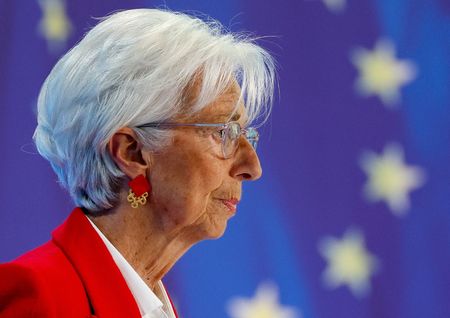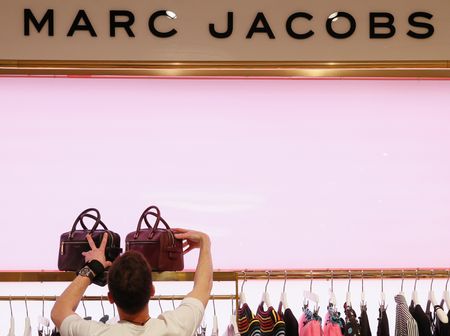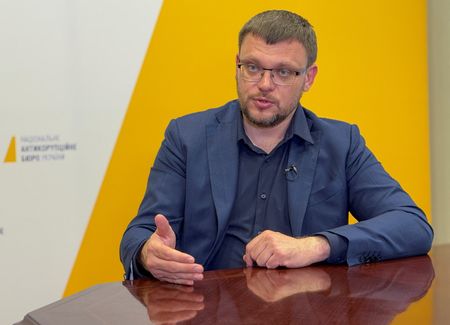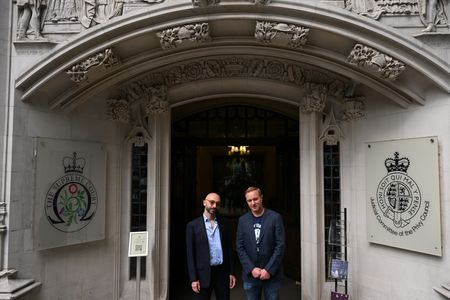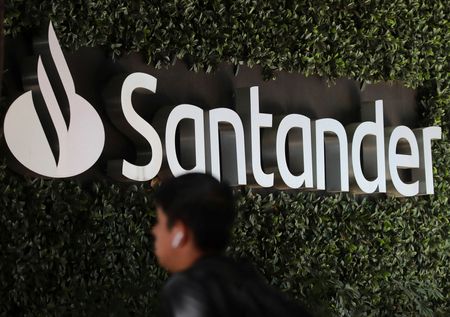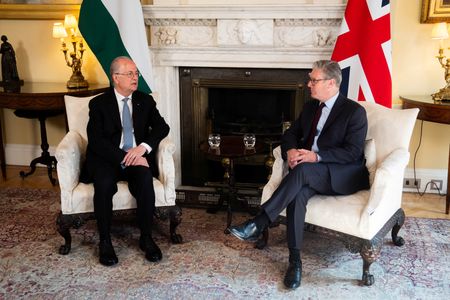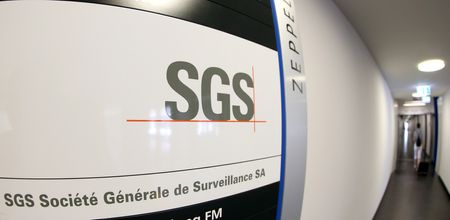By Francesco Canepa and Balazs Koranyi
FRANKFURT (Reuters) -The European Central Bank left interest rates unchanged on Thursday and offered a modestly upbeat assessment of the euro zone economy, raising doubts among investors about further policy easing even while U.S. tariff threats cloud the outlook.
The ECB has cut its policy rate eight times since June 2024 after taming a surge in prices that followed the end of the COVID-19 pandemic and Russia’s 2022 invasion of Ukraine.
But the economy was now in a “good place” and growth is in line with projections or a “little bit better”, ECB President Christine Lagarde said, bolstering market bets that the ECB may be done with cutting rates altogether.
Financial markets which had fully priced in a rate cut this autumn just days ago now see only an 80% chance of a move, and even that may not come until the spring.
Confirming waning appetite for rate cuts, sources close to the discussion said the bar for a move in September was high and would require weaker growth and inflation, along with lower staff projections.
Lagarde herself took a more measured stance and would not be drawn into rate cut talk.
“We are in this wait-and-watch situation,” Lagarde told a press conference. “We are in a good place because our projections point to inflation stabilising at target in the medium term.”
She said the ECB’s baseline projection for modest growth and inflation at its 2% target continued to hold, and that most data since the June data have confirmed that outlook.
Lagarde’s optimistic tone even prompted some economists to look again at their own projections.
“We are revising our forecasts and no longer expect a final cut of the ECB deposit rate to 1.75% at the September meeting,” Commerzbank economist Jörg Krämer said. “Now expect an unchanged deposit rate of 2.0% for the rest of this year and for 2026.”
Recent data suggest the economy is holding up well and fresh PMI surveys out on Thursday indicated an acceleration in business activity, led by a solid improvement in the dominant services industry and with manufacturing recovering.
Euro zone banks have seen rising loan demand and policy uncertainty has not yet translated into an economic or market downturn even if some companies are starting to feel the pinch from tariffs in their profits.
TRADE UNCERTAINTY
Trade negotiations still pose a risk and a final deal is far from certain, even as reports suggest that the two sides are moving closer on a possible agreement based on a 15% tariff on U.S. imports of EU goods.
“We are attentive to where the negotiations are heading (but) we take the news one day at a time,” Lagarde told a press conference.
“The sooner this trade uncertainty is resolved, the less uncertainty we will have to deal with and that will be welcomed by many economic actors including ourselves.”
While the White House has dismissed the reports as speculation, 15% tariffs would be roughly halfway between the ECB’s baseline and severe scenarios for the euro zone economy, presented last month, but milder than Trump’s threatened 30%.
The ECB’s June estimate showed that higher U.S. tariffs would result in lower growth and – depending on any EU retaliation – lower medium-term inflation in the euro zone.
Even the ECB’s baseline projection from June, which incorporates 10% tariffs from the United States, saw price growth below 2% over the next 18 months.
Lagarde acknowledged that scenario included the possibility of a temporary undershooting of the inflation target but said it was not a cause for concern.
“With growth holding up and inflation at target, we believe the cutting cycle is drawing to a close,” Konstantin Veit, a portfolio manager at PIMCO said. “The current 2% policy rate is likely a level considered the mid-point of a neutral euro area policy range by the majority of Governing Council members.”
Lagarde’s upbeat assessment also pushed short-dated German bond yields to their largest daily rise in two months, as traders took it as a signal that another series of rate cuts next year might be unlikely.
“Taking today’s meeting at face value, the bar for yet another rate cut this year has clearly been raised,” ING economist Carsten Brzeski said. “Still, we think that actual inflation could come in lower than the ECB expects and hard macro data could rather disappoint over the summer.”
(Editing by Toby Chopra, Tomasz Janowski and Catherine Evans)

